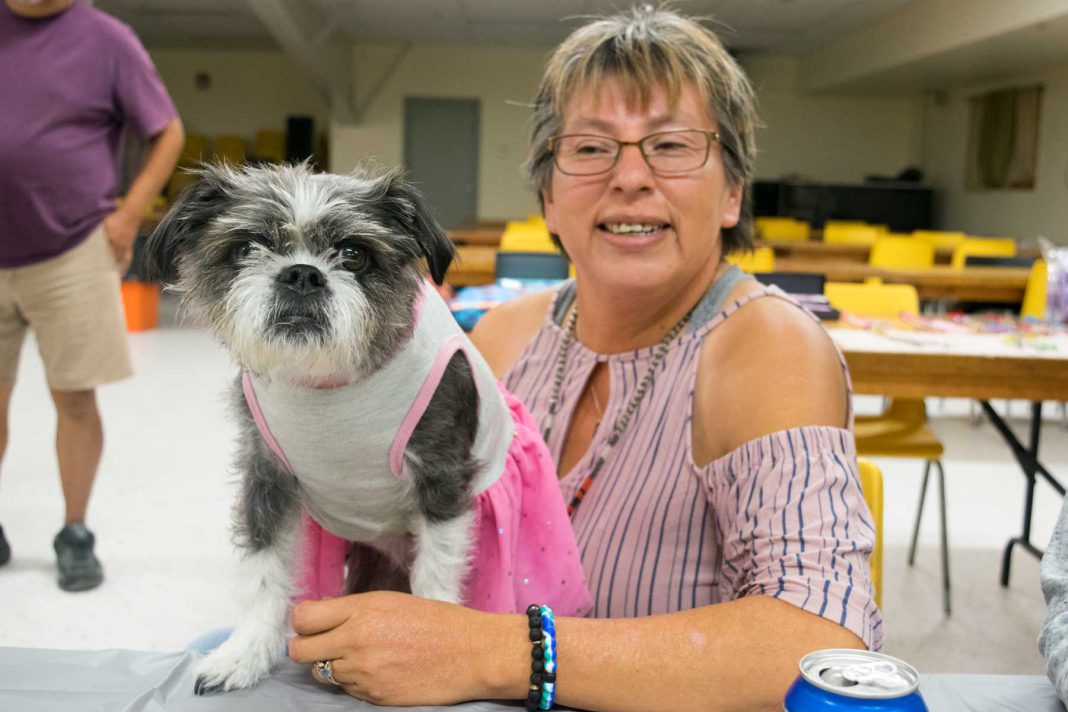WIIKWEMKOONG—A mobile veterinary clinic has spent a week in Wiikwemkoong in September, offering community members the chance to have their pets spayed or neutered, receive wellness checkups for their animals and teach their owners some care techniques.
Amanda Ellis is the enforcement manager at Welland and District Society for the Prevention of Cruelty to Animals (SPCA) and an Ontario SPCA inspector. She travels with the mobile outreach clinic to provide services to communities around the province. It has been on the road for four years, with most work being done in the spring and fall.
“This is hard work but it’s fun. We enjoy it. People need help and that’s what we’re here for,” says Ms. Ellis.
Welland SPCA visits close to 30 communities per year and roughly five of these are Indigenous communities. Wiikwemkoong has been hosting the mobile clinic for four years.
“Our next stop is Renfrew, then Cornwall, to assist the other SPCAs,” says Ms. Ellis.
Hosting these events is a collaborative effort that involves the communities they serve. Their major partner within Wiikwemkoong is the Wiky Rez Dogs Group. Members of that volunteer organization help to coordinate appointments and promote the clinic to local residents. Trained staff take care of the animal procedures.
Welland’s mobile outreach clinic is the only unit of its kind in Ontario. Ms. Ellis says a similar service exists in Alberta, but the various restrictions in different jurisdictions mean different levels of ability to conduct this work. In Alberta, for instance, clinicians are able to go door-to-door to offer their services. That practice is illegal in Ontario.
Because of the regulations, the clinic previously only visited reserves, starting with Six Nations of the Grand River, relatively close to Welland. Having a vet on a reserve is rare, which makes spaying or neutering pets a particular challenge.
“It’s not that they don’t want to spay their pets, it’s about the financial resources to do so, and the ability to travel to a clinic,” says Ms. Ellis. “We soon realized there was a huge need for this.”
The mobile clinic offers services at a lower price than would be found in a typical vet clinic, a decision that reflects the often-lower socioeconomic conditions on reserves. That helps to offset some of the factors that have led to the rez dog problem.
With the amount of stray dogs roaming reserves because of their rapidly-reproducing populations, they are not just a nuisance—they are a legitimate safety risk.
“We’ve been seeing a decrease of animals entering the schoolyards, which means less of a threat to our kids,” says Tim Ominika, Wiikwemkoong band councillor.
Rez dogs in Wiikwemkoong have been known to go after children in the schoolyard and steal their lunches, according to Jean Flamand, who has been credited with starting to deal with troublesome dogs in Wiikwemkoong. Fortunately, the kids themselves have not been targeted, but the situation is still stressful for children and could easily deteriorate.
Ms. Flamand began taking stray puppies out of the community herself, without any funding, to give them up for adoption. She also helped to deal with pets with injuries for which the pet owners could not afford vet fees. She would take them to the nearest animal hospital in Mindemoya, where they could be treated and brought to pet rescue hostels.
The Ontario Veterinary Association (OVA) at the University of Guelph previously had no regulations in place to accommodate travelling clinics. Once Welland SPCA’s mobile outreach clinic proved successful in Six Nations, it was granted a first-of-its-kind exception to practice in communities around the province.
Spaying and neutering services are only one part of the mobile outreach clinic. It offers a wellness clinic for pets in the community where they can receive important services such as vaccinations and even microchips. There is also an education component.
“There’s a lot more to this than just spaying and neutering. When (pet owners) leave here, they have got everything they need to care for this animal,” Ms. Ellis says.
In total, 68 pets underwent surgery to be spayed or neutered in Wiikwemkoong and 157 pets received wellness checkups.
Representatives from the St. Catharines and Espanola Pet Valu stores were also on-hand to help out. Jeff Riley is on the board of the Welland SPCA; he and his wife Rhonda co-own the St. Catharines location. They came to Wiikwemkoong on their first “spaycation.” They say they got to try helping at most of the stations in the clinic, from babysitting dogs after their procedures to administrative work.
“You get a greater appreciation for this whole event,” says Mr. Riley.
“Experiencing that today, we can see why it’s so important,” adds Ms. Riley.
They had invited Rachel Huard and Lori Hannon from the Espanola Pet Valu to join them, who describe their visit as “an eye-opener.”
Jenni Manitowabi strongly advocated to get Welland SPCA to visit Wiikwemkoong. The main leaders of the Wiky Rez Dogs group are now Ms. Flamand, Rachael Maiangowi and Bruno Henry.
The efforts are starting to make a strong impact on the community as more people support these initiatives. Councillor Ominika says Wiikwemkoong band council has recently passed a bylaw in favour of getting animal control officers into the community.
The SPCA workers who travel with the clinic say they enjoy the chance to visit so many places and meet people. Like Mr. and Ms. Riley, they also refer to their travelling jobs as a “spaycation.”
“We like to thank the communities,” says Ms. Ellis. “They act in a compassionate and friendly manner; it’s always a pleasure to come into their community.”
Wiikwemkoong director of operations Kevin Wassegijig notes how much this event relies on volunteer contributions. “We want to credit the volunteers who do all the work for our community,” he says. “There’s good support from the community—people come year after year.”
On the second last night of the clinic, Wiikwemkoong hosted a dinner for everyone who had helped out with the mobile clinic. At the end, Margaret Tish Manitowabi addressed the room, along with Mr. Wassegijig and Councillor Ominika. Ms. Ellis and Welland SPCA mobile coordinator and investigations dispatcher Nina Turmel received a painting in thanks for their support. All the participants were offered a gift to commemorate their time in Wiikwemkoong.




